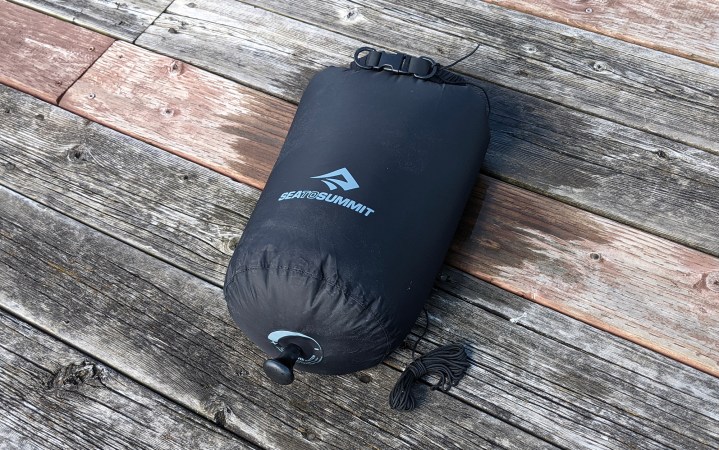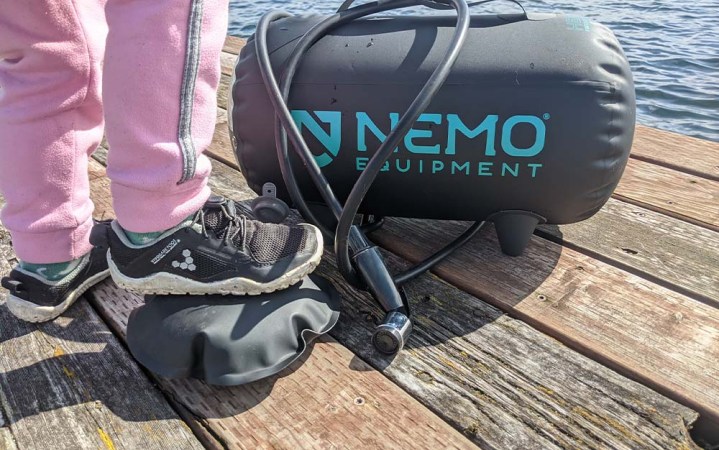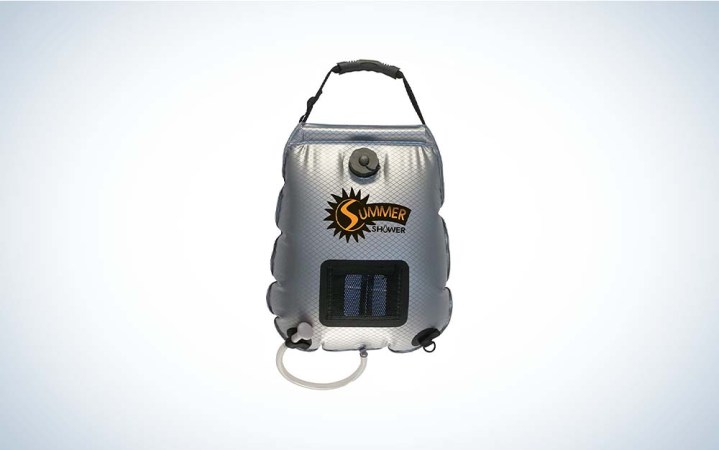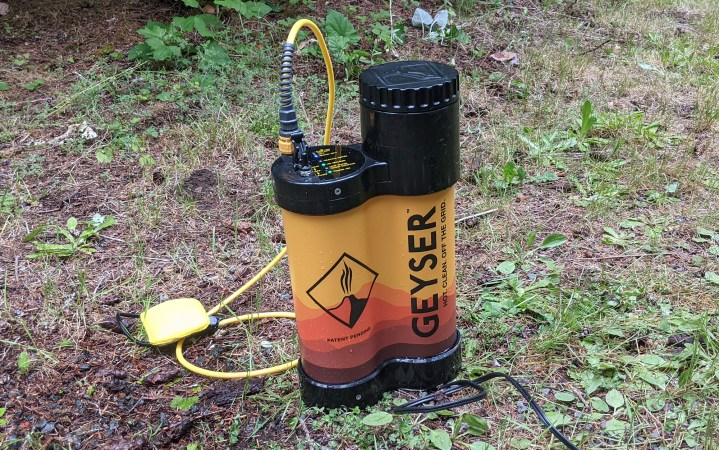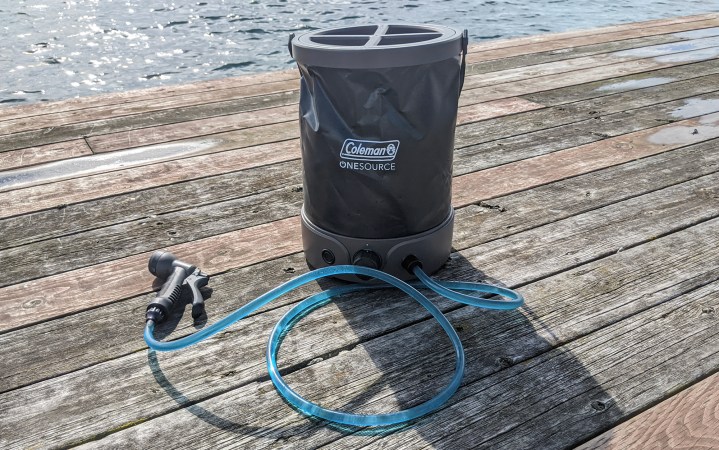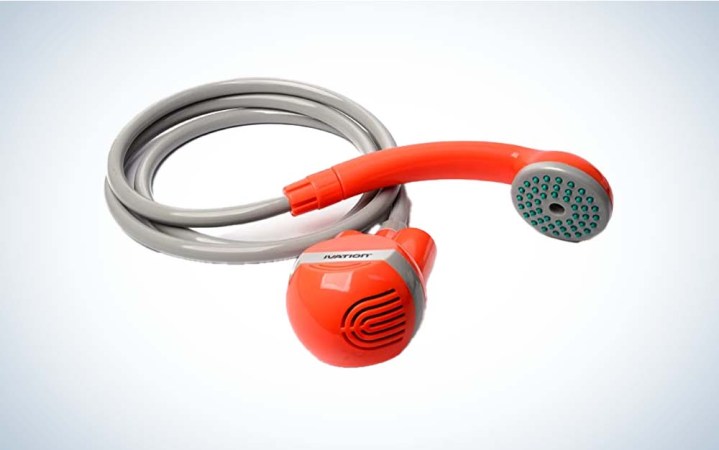We may earn revenue from the products available on this page and participate in affiliate programs. Learn More ›
Nothing is more satisfying at the end of a long, hard day of hiking than a camping shower. But the farther off grid you get, the less likely you are to see running water, especially if you’re staying at a primitive dispersed site. For years, that meant the shower would have to wait until you made it back to civilization again. But today, there are a number of camping shower options available that make getting cleaned off a real option for adventurers in the backcountry. To help you decide which one is right for your needs, I checked out the best camping showers on the market to find the top ones for every outdoorsperson.
How I Tested the Best Camping Showers
I tested the initial field of camping showers in tandem on a mid-60s June day, during which I considered the following criteria:
- Mechanism: How the camping shower moved the water through the nozzle, and how it compared to other camping showers using similar mechanisms.
- Ease of Use: I considered how difficult it was to set up the camping shower, both for the first time and on an ongoing basis.
- Weight and Size: To better understand the variable weight and size of camping showers varies, I carried each camping shower two-thirds full up and down three flights of stairs. I also considered whether a camping shower was lightweight enough (when empty and stored) to take backpacking or if it was appropriate for car camping only.
- Water Pressure: Anyone who has ever tried to wash their hair under subpar water pressure knows that this is one of the important considerations for a camping shower. I compared the spray of each camping shower against one another to determine which had the strongest flow rate and which was able to maintain its flow rate the best over the length of time that someone would typically shower.
I tested the Kakadu Outback and Geyser Systems shower over a cold and dreary Memorial Day weekend in the Pacific Northwest, with an eye toward how well these systems functioned in conditions where solar isn’t a realistic option.
The Best Camping Showers: Reviews & Recommendations
Best Overall: Decathlon Quechua Solar Pressure Shower 500
Key Features
- Foot pump
- 2.6 gallon capacity
- Packed Size: 8.7 inches x 15.4 inches x 4.7 inches
- Weight: 1.9 pounds
Pros
- High flow rate from the nozzle
- Pump handle is easy to use
- Easy to tell when the camping shower is fully pressurized
- Option to add hot water directly to the main chamber
Cons
- Water took a long time to heat up
- Tube with the nozzle could attach more securely to the main chassis
This Decathlon Quechua Solar Pressure Shower 500 hit the sweet spot during testing — not as pricey as some of the high-end models but with significantly greater functionality over the budget or gravity-powered units. It operates via human-generated internal pressure, which you add to the camping shower via a pump plunger on the top, something most individuals will be able to operate with one hand. This means that, as you shower, when there is a drop in pressure, you’ll have to pause and repressurize the water chamber.
That might sound a little annoying (and it is), but the water pressure generated by the Decathlon Quechua Solar Pressure Shower 500, the most impressive in my test, makes this more than worth it. This is the camping shower that I would choose to use if I needed to wash my hair or even just needed to get off a particularly thick layer of mud from the best hiking shoes or sweat from the back of my legs after a tough day of hiking.
While the number of plastic parts used in the Decathlon Quechua Solar Pressure Shower 500 gives me pause. Each connection point representing a place where the integrity of the polypropylene body, and thus the ability of the camping shower to pressurize itself at all, could fail. But the only issue I ran into during testing was with the tube connecting the nozzle to the water chamber. If I wasn’t careful while using the camping shower it would disconnect, forcing me to pause to reconnect the tube and repressurize the chamber. Most of the other features turned out to be plenty functional,including a window to see how much water was left in the chamber, an air-release valve so that the water chamber didn’t become over pressurized, and three kickstand legs that kept the water chamber from flopping over even when it wasn’t completely pressurized. And the sling on the water chamber made carrying this from my water source to my testing site a breeze, as I could loop it over my shoulder rather than having to awkwardly carry it in one hand.
Best for Glamping: Kakadu Outback Shower
Key Features
- Rechargeable lithium battery or 16-ounce camping propane cylinder
- Requires an external water source
- Packed Size: 17 inches x 15 inches
- Weight: 16 pounds
Pros
- Instant hot water
- Multiple ways to power
- Easy to use
Cons
- Bulkier than other options on this list
- Expensive
I live in the Pacific Northwest, where there is no guarantee that there will be enough sun to warm up a camping shower. Fortunately, there are now a number of options to heat up the water for your shower, no solar required. One I came away impressed with after testing was the Kakadu Outback Shower. What makes this one unique is that it creates hot water instantly, without needing to wait around.
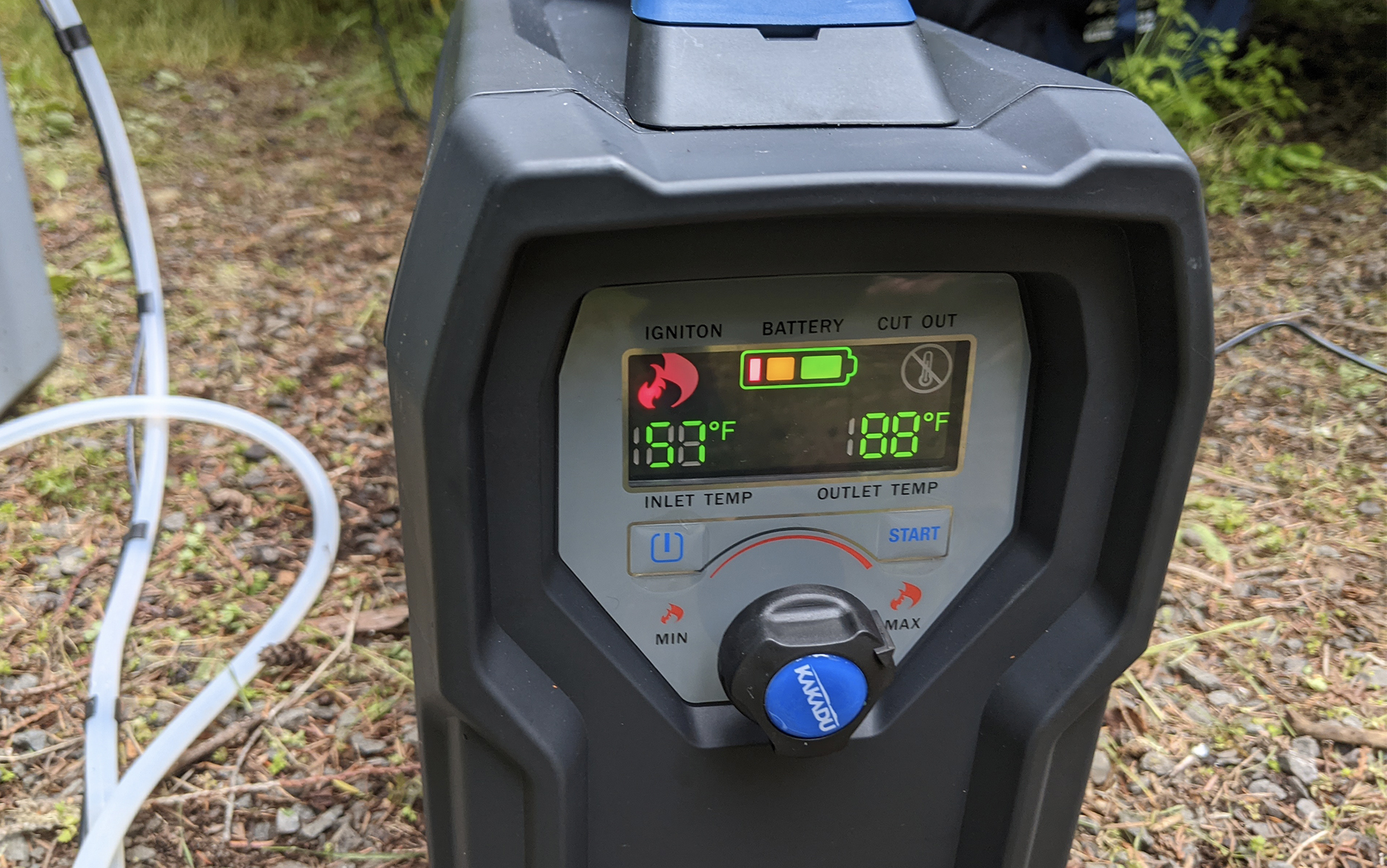
Laura Lancaster
While I was unable to charge it up on site using my power station (the Bluetti AC60), screwing on one of the propane tanks we had brought along for our camping stove was a breeze and instantly generated hot water. I would recommend charging up the internal lithium battery in advance of your trip if you plan to power your shower that way instead.
Read Next: The Best Portable Power Stations
The only catch during testing was that the hoses weren’t quite as intuitive to put on as I had expected. You need to pull the blue nozzle cap backward to secure onto the inlet and outlet. But once I had that part figured out, this was a surprisingly straight-forward unit to use and could easily do double-duty for both dishwashing and showers. I plan to continue testing this unit to see how it performs and will update this review accordingly.
Most Compact: Sea to Summit Pocket Shower
Key Features
- Gravity powered
- 2.6 gallon capacity
- Packed Size: 5.5 inches x 3.25 inches x 3 inches
- Weight: 4.3 ounces
Pros
- Smallest packed size of my test
- Light enough to take backpacking
Cons
- Low pressure nozzle
- Must be hung up to be used
The Sea to Summit Pocket Shower was easily the most minimalist camp shower in my test, and you wouldn’t have a problem stashing this one in your backpack. It’s essentially a 10-liter bag with a roll top on one side and a low-tech nozzle (don’t expect a significant blast here, gravity is the only force at play). On the other side, screw to the left to open and to the right to close. To add water, just dunk in a nearby lake (checking first that there is no debris that could clog the nozzle), or hold it open under a faucet until the water reaches the fill line on the inside. Then, roll the top down three times and snap the buckle shut. Now it’s ready for you to lay out in the sun for a few hours to warm up the water inside.

The next part is a little more complicated — you actually need to get this puppy elevated enough to use. The internet is full of solutions to this problem, from pulley systems on tree branches using carabiners to lantern stands to elaborate jerry-rigged car hoists. My personal approach to this style of bag has always been to tie it off at a height I can reach (meaning I need to crouch down while showering), so it’s worth keeping in mind how much trouble you’re willing to go to set up a shower like this before making a purchase.
Best Foot Pump: NEMO Helio Portable High-Pressure Shower
Key Features
- Foot pump
- 2.9 gallon capacity
- Packed Size: 5.5 inches x 8.5 inches
- Weight: 1.3 pounds
Pros
- Foot powered pump left my hands free while in use
- Intuitive design
Cons
- Expensive
- Not as much water pressure as other pumps in my test
The NEMO Helio operates off a similar mechanism as the Decathlon Quechua Solar Pressure Shower 500, except that instead of pressurizing via a topside pump plunger, it uses a foot pump connected to the main body by a short tube. During testing, I noticed it was easier to repressurize the chamber without having to put down either a washcloth or the nozzle, which is connected to the water chamber by a second seven-foot-long tube.
While the NEMO Helio was arguably easier (or at least more convenient) to use than the Decathlon Quechua Solar Pressure Shower 500, it ultimately didn’t create as much water pressure out of the nozzle. It was also more difficult to fill up and seal the chamber, even if the overall streamlined aesthetics were more pleasing once the shower was set up and ready to use. That said, if the Decathlon is out of stock, or you simply feel strongly that you want the ability to repressurize on the fly, then this is an excellent choice.
Fastest Heating: Advanced Elements Summer Shower 5 Gallons
Key Features
- Gravity powered
- Available in 2.5 to 10 gallon capacity
- Packed Size: 17 inches x 11 inches x 1 inch
- Weight: 1.3 pounds
Pros
- Water heats up quickly
- Temperature gauge
- Inexpensive
Cons
- Must be hung up fairly high to use
- No provided storage bag
Let’s start with the good here. The Advanced Elements Summer Shower heats up water fast. In my test, it was the only camp shower where the water would be considered a comfortable temperature for showering after being left in the sun for four hours. Of course, fast here is relative. Unless it’s an extremely hot day (when you might not mind a cold shower anyway), you’ll still need to plan ahead of time if you want a warm shower.

While the Advanced Elements featured a temperature gauge, I found that it didn’t provide an accurate read of the water temperature inside the bag. That being said, it still provided some clue as to whether the water was indeed heating up. With the other camp showers in my test, the only way to find out was to waste a little of the water you planned to shower with later. The Advanced Elements Summer Shower also had a small mirror that stored inside of a mesh pocket on the front.
Like the Sea to Summit, this shower must be elevated above head height to use and does not provide as powerful a spray as the battery-operated camping showers or ones that used human-powered internal pressure.
Geyser Systems Portable Shower with Heater
Key Features
- Charges via an external power station
- .8 gallon capacity
- Packed size: 16 inches x 9 inches
- Weight: 8 pounds
Pros
- Easy to use
- Charges from a portable power station
Cons
- Only releases a small amount of water at a time
- Expensive
While I was excited to test the Geyser System Portable Shower with Heater, in the end it didn’t quite justify the price point or space in my camping setup.
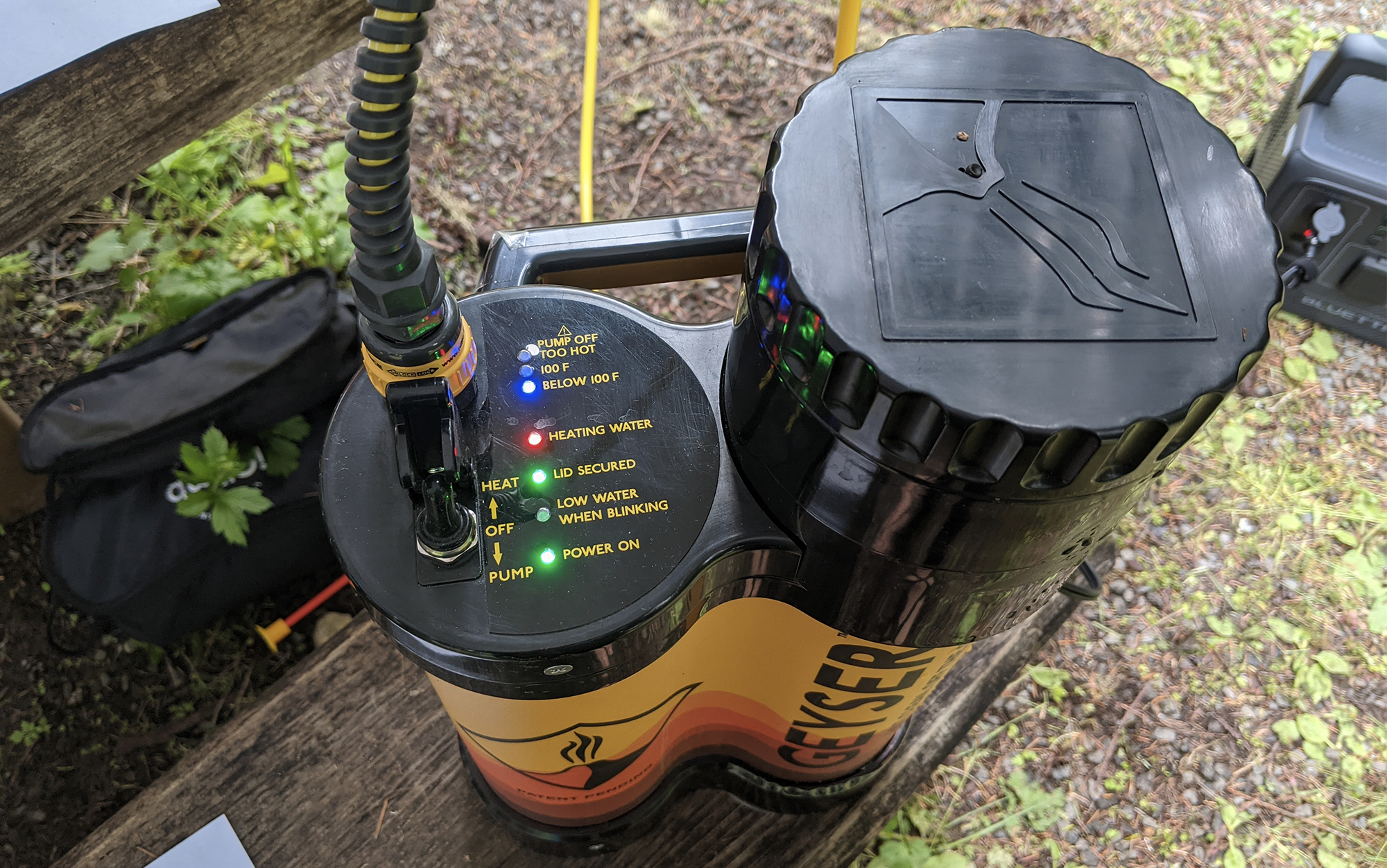
Laura Lancas
Unlike the Kakadu, this one powered up just fine using my Bluetti AC60 (it could also be plugged directly into a car). The labels were clear and easy to read, so I always knew what the device was up to at any given point in time. Whereas my pick for best glamping is directly heating up water as it passes through the system, the Geyser is heating up a fixed amount of water, sort of like a tea kettle. Once you’ve used up that amount of water, that’s it: you’ll have to add fresh water and wait for the unit to heat back up again (about twenty minutes) to continue. To help reduce the amount of water you’re consuming, the Geyser only lets out a small stream at a time, and attaches directly to a sponge.
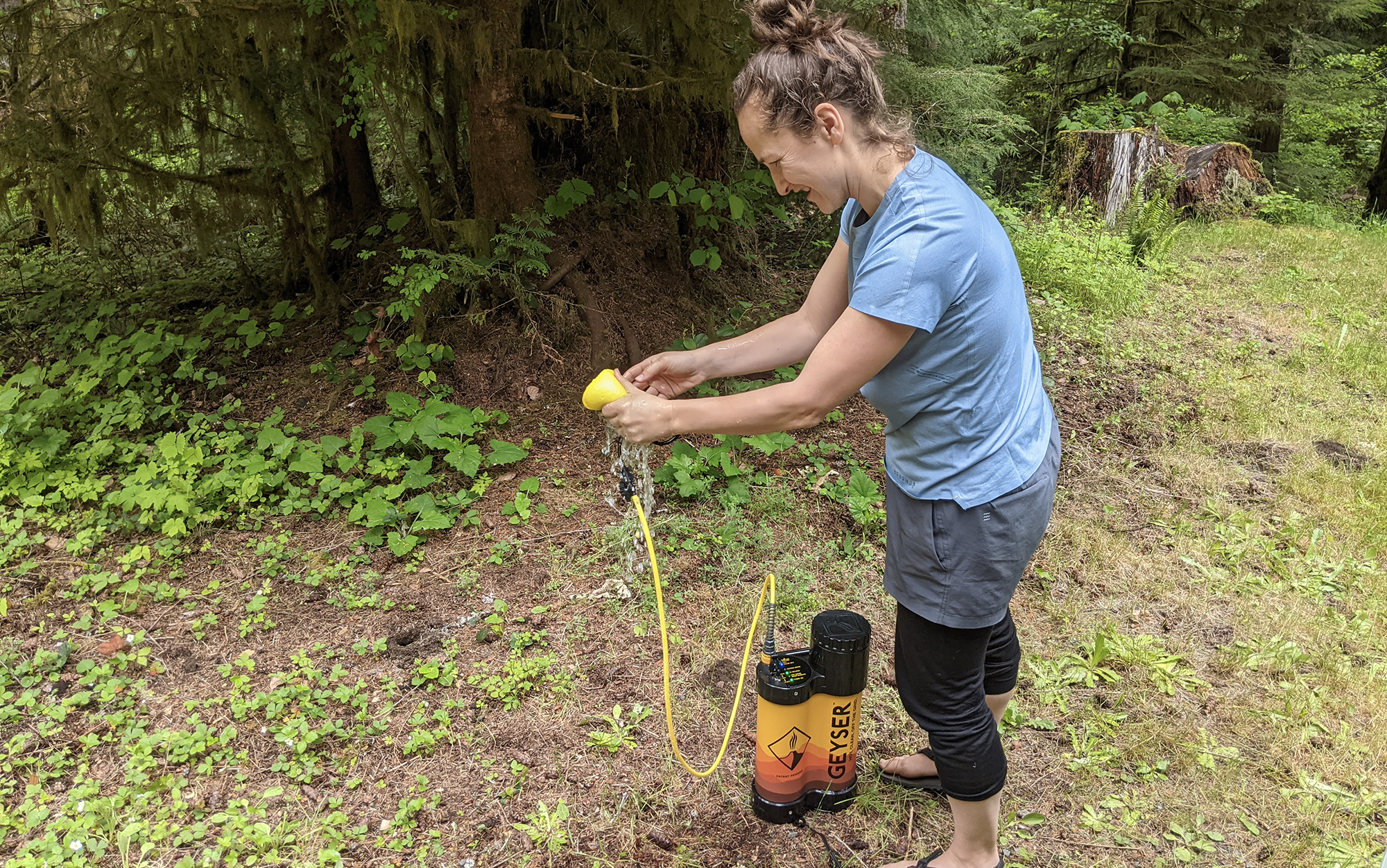
Laura Lancaster
The experience of using the Geyser Systems Portable Shower with Heater was reminiscent of taking a sponge bath out of a basin of water you’ve heated up over a stove. That’s not a bad thing, but it did feel redundant. If you’re planning an outing to the beach where you just need a quick rinse at the end of the day before heading a home, this is a great choice, but most campers (who are probably packing the best camping kettles and the best camping stoves anyway) will likely find it redundant.
Coleman OneSource Rechargeable Built-In Pump Camp Shower Sprayer
Key Features
- Rechargeable battery
- 3 gallon capacity
- Packed size: 11.6 inches x 8.3 inches
- Weight: 5.7 pounds
Pros
- Easy to set up
- Long-lasting battery also doubles as a flashlight and USB charger
- Adjustable nozzle
Cons
The Coleman OneSource Camp Shower is very easy to use. Once the basin filled with water, it was simply a matter of securing the top, popping in the battery, and hitting start. And unlike pump showers, it didn’t need any further fiddling after that point. This is one of the best camping showers that allows you to keep spraying the water until there’s nothing left in your reservoir.
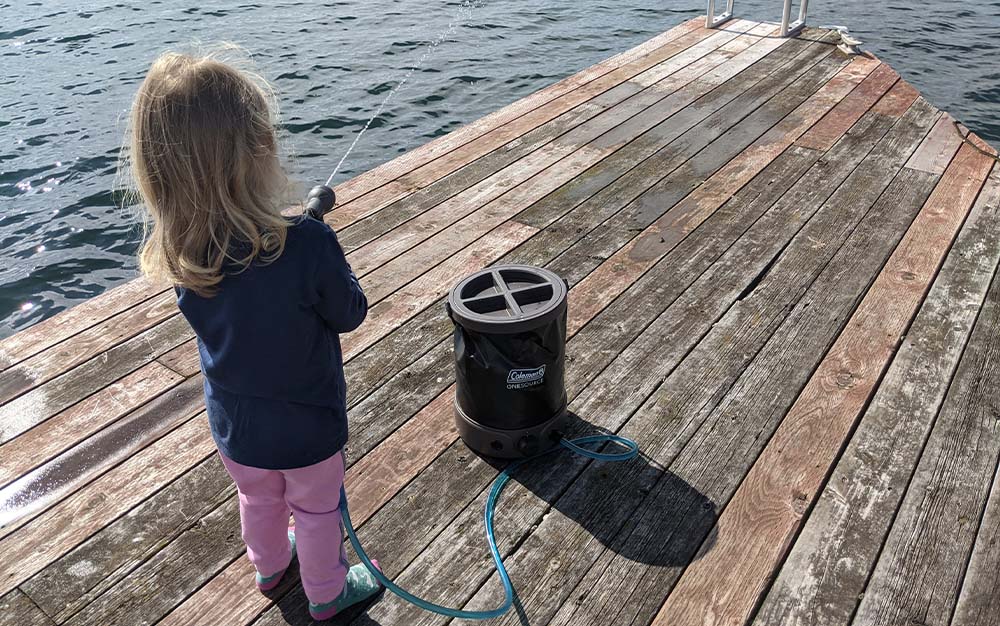
The Coleman OneSource tied for second (after the Advanced Elements Summer Shower) in how quickly the water warmed up when left in the sun, and it also had one of the most impressive spray pressures, just behind the Decathlon. Something that set the nozzle of the Coleman OneSource apart from the others in my test is that it can be adjusted from a single, high-pressure stream to a mist spray with multiple options in between. I also liked that it had durable material on the base protecting the thinner plastic sides from any abrasions on the ground.
Ivation Battery-Powered Portable Shower
Key Features
- Rechargeable battery
- No provided water capacity
- Packed Size: approximately 15 inches x 11 inches
- Weight: 1.8 pounds
Pros
- Low cost for a battery-powered spray
- No pumping required
- Small packed profile
Cons
- No provided storage bag
- No way to heat water prior to use
- Internal battery could be more secure
For campers venturing out during the dog days of summer, a hot shower isn’t always necessary (or even desirable) but getting a strong spray is. Since there isn’t an accompanying water chamber for the Ivation Battery-Powered Portable Shower, and thus no way to heat up the water, you’ll need to supply a DIY reservoir of your own. A plastic bucket works great for this purpose, and gives you more flexibility with how much water you’re setting aside for your shower.
To use the Ivation Battery-Powered Portable Shower, you simply hit the on switch (hidden under a flexible gray cap) and drop the pump end of the tube into the water. It’s important to note here that the pump also houses the internal battery, which is protected from the water by a simple twist-off cap. This represents both a failure point and a safety issue, so it’s worth double checking the security of the cap before each use and also checking that there was no water encroachment underneath the cap before storage.
Because the on/off switch is on the pump end of the shower (rather than the nozzle end), it’s more difficult with this camping shower than others in my test to turn off the water flow. Further, since it can push water through the nozzle at an impressive velocity (generally a good thing during testing), it can tear through even a sizable water supply fairly quickly. The larger the reservoir you’re able to secure for this camping shower, the happier you will be.
Things to Consider Before Buying a Camping Shower
Gravity vs. Pressure
To work, a camp shower must move water quickly through the thin neck of a nozzle so that there is sufficient velocity behind it to spray out on the other side. In practice, this is generally accomplished in one of two ways: via gravity or building up internal pressure. Camp showers that rely on gravity are designed to be elevated before use, either in a tree or via another mechanism, with the shower nozzle on the underside of the water source. When the nozzle is opened, water is released. Typically, gravity will give you enough velocity to rinse your body reasonably well, but forget about washing your hair.
There are two ways that camp showers use internal pressure to push the water through the nozzle. The first is human-generated: by pumping air into the chamber holding the water, and enough pressure builds up that it shoots out when released at the nozzle end, usually at an impressive velocity. While this typically does create a comparable amount of pressure to your average shower nozzle, human-powered camping showers do need to be pumped occasionally to keep the pressure up.
Other camp showers use internal batteries to push water through the nozzle, which must be recharged periodically to continue to use, either at home or via one of the best power banks for camping.
Capacity
Most camping showers can hold between two and three gallons, which is usually enough for two people to have a three-minute shower each, which is long enough if you’re being careful. Given the amount of time it takes the average camp shower to heat up in full sun (about three hours), it may be worth purchasing additional camp showers for groups of four or more.
Flow Rate
The higher the flow rate of a camping shower, the better job it will do of cleaning off any dirt or grime you’ve picked up while camping. This is a more important consideration than the overall capacity.
Packed Size
While some gravity-powered camping showers are small and lightweight enough to take on a backpacking trip, most are fairly bulky and may even be paired with a shower tent. Consider how much space in your vehicle or backpack you are willing to dedicate to a camping shower before committing to a purchase.
FAQs
Camping showers cost between $30 and $500, depending on the mechanism used to move the water through the nozzle. Gravity-powered camping showers will generally be the least expensive (with less powerful water flow), while battery-operated camping showers (especially those that heat up) generally cost more.
You can expect a camping shower to last for about seven minutes, depending on the flow rate and the capacity. That’s typically long enough for two showers, assuming the water is only turned on when you’re ready to rinse.
The length of time it takes to heat up a solar shower depends in part on how hot the day is and how much water you are trying to heat. In general, it’s best to give a camping shower at least three hours to warm up in direct sunlight before use, more if you’re looking for an especially hot shower or if the day is overcast. Before showering, it’s always a good idea to check the temperature of the water to ensure it isn’t too hot.
If you are camping in the backcountry, whether on a backpacking trip or at a dispersed site, it’s important to follow Leave No Trace principles to minimize disruption to the surrounding ecosystem. The most important part of this is to set up your camp shower at least 200 feet (with some recommendations going up to 300 feet) from any surrounding water sources, as well as the trail or any surrounding campsites. If you use soap, which most campers and backpackers agree isn’t really necessary, then it’s important to use as little as possible by lathering up a bandana or camping washcloth and using that to clean off. While it’s essential to ensure that none of the water that you are using for your shower makes its way back to a water source, using a biodegradable soap can also help minimize the impact to the environment.
Final Thoughts on the Best Camping Showers
There is a lot of variety between the best camping showers currently on the market, from fully battery powered to pressurized chambers to simple bags with a nozzle at one end. You can purchase these camping showers from well-known companies like NEMO Equipment and Sea to Summit as well as from pop-up brands like Ivation. After trying out some of the most popular models available, I’m recommending the Decathlon Quechua Solar Pressure Shower 500 as a great mid-priced option that will fit most people’s needs, with the Kakadu Outback as a great option for glampers looking for hot water on demand. Backpackers should check out the Sea to Summit as a great lightweight choice that had the smallest packed size in my test.


